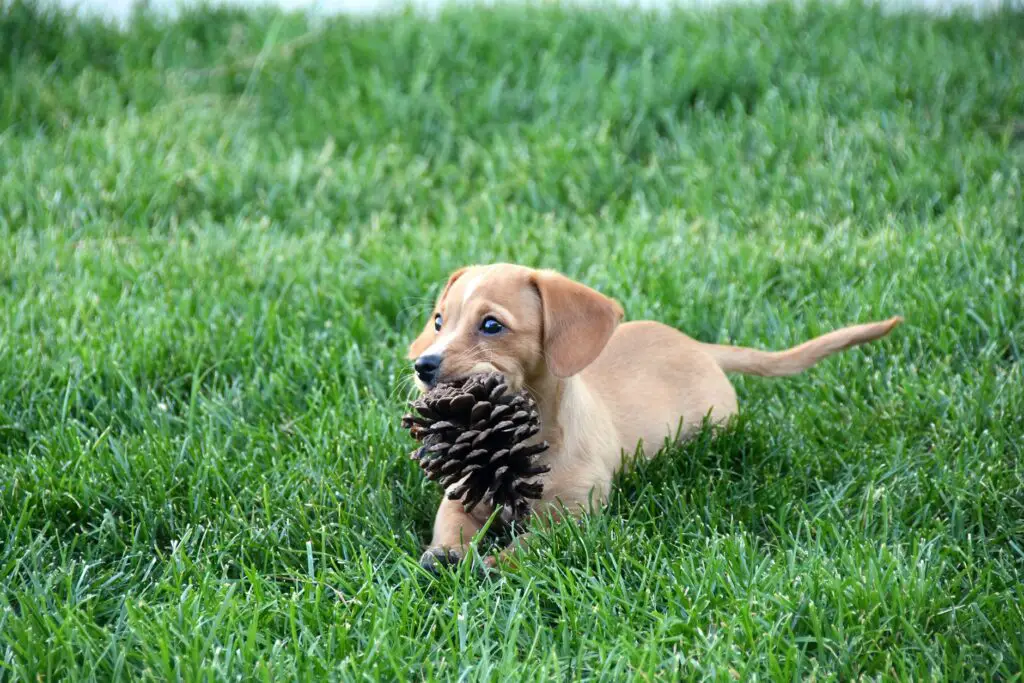Whenever I write one of these posts, I always think that, as dog owners, we don’t always get to choose what our dogs put in their mouths. You pick the dog food. You can buy all the good treats and toys, but you can’t stop your dog from chewing or chowing down on something found at the park or in the house when you’re not looking.
We’ve written on similar topics before, answering whether it’s OK for a dog to eat black pudding, zinnia flowers or even scrambled egg with cheese, but what about the things they find outside the house? Your dog chewing on a pinecone, for example. As owners, we can’t control external environments the same way we can when inside our own homes (and even that isn’t easy).
Our dog likes picking things up when we’re out walking, and we’ve had to be careful about what he puts in his mouth.
Whether it’s trash, random debris, rotting food or pinecones, sometimes it’s difficult to stop them from picking things up.
Can Dogs Chew on Pinecones?
What are pinecones?
The pine cone comes from the pine tree. According to the Woodland Trust, pine cones fall between September and December. Many of us associate them with the fall or with the holidays. The cones contain seeds that are protected by the rough spiky shell. Once the seeds are pollinated, the cone opens up, and the seeds inside can travel on the wind and then potentially grow into trees of their own. Pinecones are commonly associated with the fall months, but they’re popular at Christmas too and added to trees, wreaths and tables as decorations.
Why would a dog want to chew a pinecone?
They’re just about the right size for a dog’s mouth. Pine cones have a rough texture, too, which probably feels nice inside the dog’s mouth, familiar in the way that a stick can be. Dogs used to carrying balls or retrieving things may also associate the shape and size of the cone with one of their favourite toys. The smell can be a factor too.
Are pine cones safe for dogs to chew?
Pinecones aren’t toxic to dogs. There are a lot of dog owners who’ll say there’s nothing wrong with letting a dog chew on one, but that’s not always great advice. Whilst not poisonous to a dog, pinecones can cause other health issues, resulting in a trip to the veterinarian.
Firstly, its thick bark-like shell can get stuck in its throat. This can lead to respiratory distress or suffocation. Occasionally, you’ll also see this happening with sticks and branches. One article on an Australian veterinarian website writes that one owner brought in a Staffordshire bull terrier with a high temperature and severe panting. When vets examined the dog, they found part of a pine cone wedged in the back of its throat.
As pinecones are sharp, they can also cut into the skin inside a dog’s mouth and the tongue and throat.
We’ve also found one account of an owner on Dol Forums who said their dog snorted a small piece of a pine cone that got stuck up its nose. It took 4-weeks to diagnose and then a 45-minute session (and a fair bit of money later) with a specialist to remove.
However, one of the biggest concerns for veterinarians is that pinecones can obstruct the dog’s digestive system. Think about something as large as a pinecone trying to move through a dog’s stomach and intestines.
On the Just Answer website, one veterinarian writes that ‘most dogs that are obstructed just vomit and don’t eat and everything comes back up.’ She also notes that if a dog has swallowed an entire pine cone, then it’s likely it will lead to an obstruction. In these cases, it’s essential to contact a veterinarian as soon as possible because it can be fatal.
Owners walking puppies should be especially vigilant on walks because puppies have smaller intestines and stomachs.
How to stop a dog from picking up a pinecone
We find that using the ‘leave’ or ‘drop’ command is very helpful. If we see something in our dog’s mouth, we give the order, and most of the time, it responds to us immediately. Using verbal instructions requires patience and training, but it’s a helpful tool when you’re out with your pet. Remember, it’s not only pinecones that they’re likely to pick up, and the command could be the difference between a severe medical issue and a pleasant walk.
Of course, many owners don’t worry about what their dog picks up. They’ll always say that they’ve had dogs for years without any issue, and that’s probably true. In the same way, you might eat apple slices from the sharp edge of a penknife blade without cutting your tongue; there’s always a chance that it will cause injury one time.
Another thing to do is avoid walking in wooded areas during the fall. Where there are a lot of pine trees, you can expect a lot of pinecones, which may prove too tempting for your dog to ignore. Altering your walking route to account for this will help.
If your dog enjoys carrying something in its mouth during a walk, take a toy with you and let them fetch and bring that. Pinecones may not be poisonous, but they pose some risk to your dog’s health and should be avoided or replaced with something more suitable.
Dogs have died from having an intestinal blockage, so don’t underestimate how dangerous a pinecone may be for some dogs.


pya371
c95izp